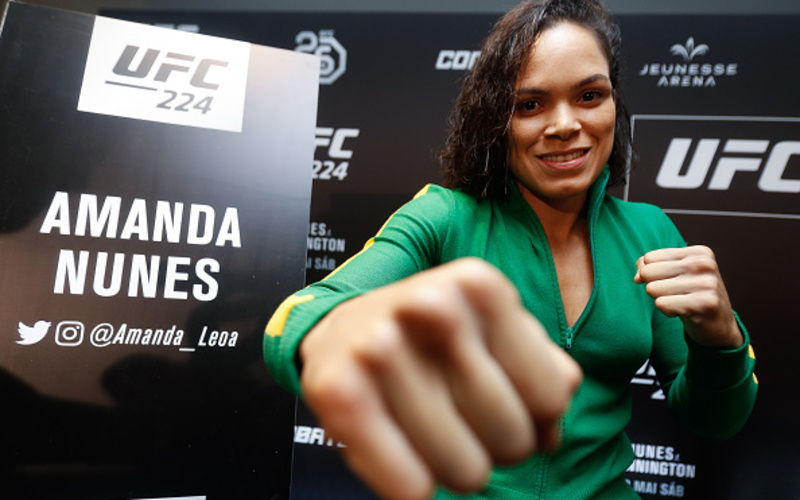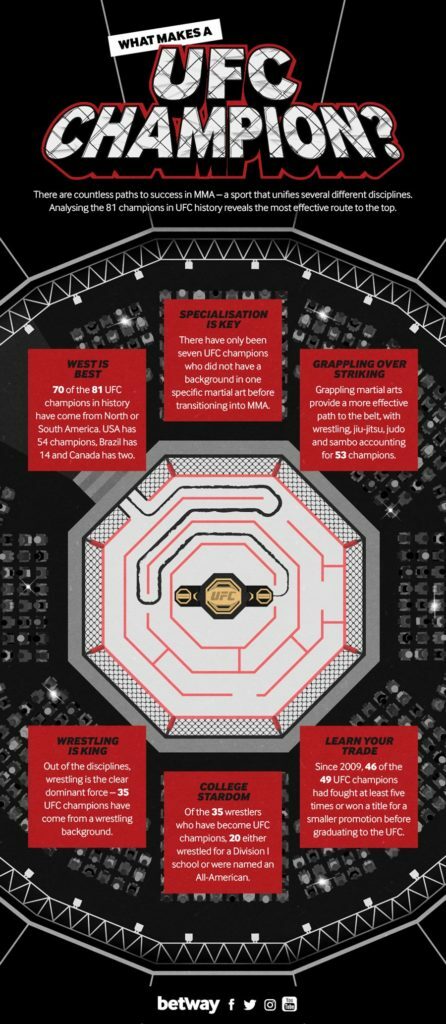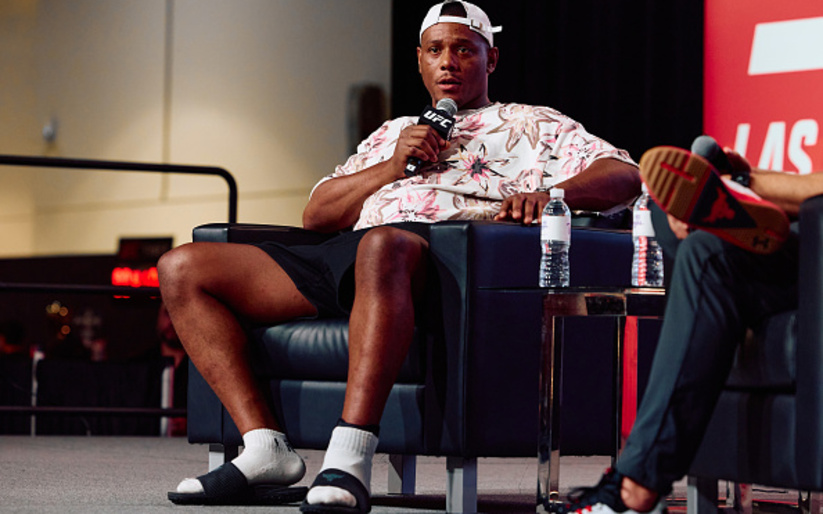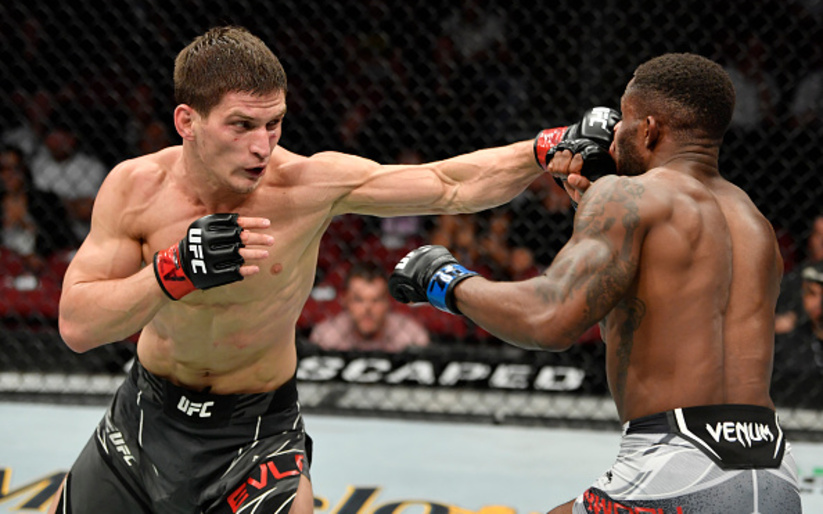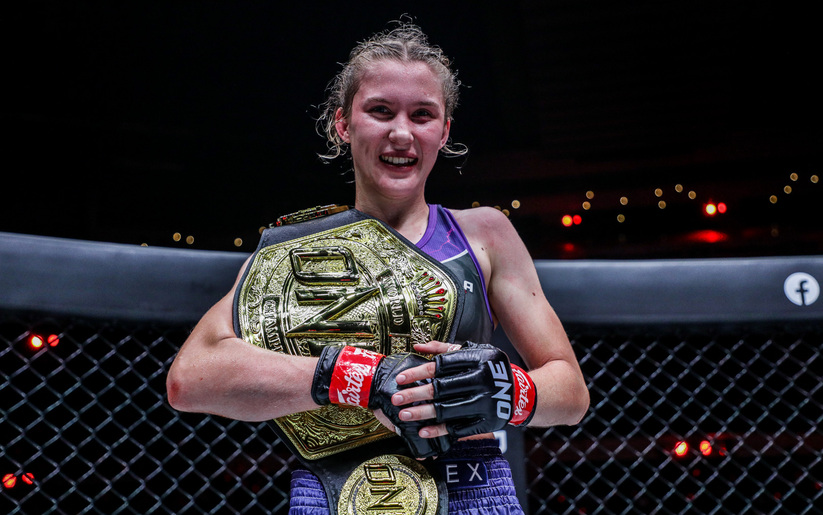What Makes a UFC champion?
The path to UFC gold holds no mold, but in any data set recurring patterns do exist. One would be apt to think becoming a UFC champion entails something different for every athlete. But after analyzing the 81 champions in the history of the promotion, the most effective route to the top became evident.
There are a hefty amount of paths to take in becoming a successful professional athlete. One could follow the road of Tom Brady. The unwanted, undesired, underdog who never took no for answer. It’s equally possible taking the path to greatness which LeBron James did.
The vast difference in the origin stories of athletes is particularly true in the realm of mixed martial arts. Especially so, for those who have earned the most prestigious honor in the sport: the UFC title.
Modern Mixed Martial Arts
MMA is a modern amalgamation of numerous different martial arts disciplines, ranging from wrestling and jiu-jitsu to boxing and Muay Thai. As a result, there are opportunities for athletes competing in those sports to transition into MMA.
For example, UFC featherweight champion Max Holloway started out in kickboxing at high school before discovering MMA. His opponent upcoming opponent at UFC 240, Frankie Edgar, was a standout wrestler at college before making his MMA debut on just a few weeks of training.
These two fighters alone illustrate the different routes available to martial artists seeking an opportunity in the UFC. In the UFC more money is to be made than within the specific disciplines as noted in online sites such as Betway UFC.
81 Champions
Since the modern concept of MMA champions were introduced in the UFC in 1997, 81 fighters wore the gold strap around their waist. These 81 represent many different backgrounds and nationalities. Some paths, however, have been taken more often than others.
Fighting style illustrates this point well. For example, in overly simple terms, style can be split into two general categories: grappling and striking. Most older (and few today) mixed martial artists started out in a single discipline before transitioning to MMA. MMA is a sport in its infancy when compared to some martial arts, which have developed over hundreds and, in some cases, thousands of years.
A fighter’s favored discipline before MMA is extremely important – it can dictate the way they fight in the octagon. According to the statistics, it plays a part in how successful they can be.
Of the 81 champions crowned by the UFC to date, 53 came from a background in grappling. In that group of 53 champions, 35 took up wrestling as their dominant martial art before moving into MMA. That is 43 percent of all UFC champions to date. A number which is a far higher portion than any other discipline. The other major grappling discipline, Brazilian jiu-jitsu, has produced the second-most UFC champions with 17.
Perhaps surprisingly, there have been just five UFC champions with a specialist background in arguably the world’s biggest combat sport; boxing. The statistics show; anyone hoping to be the next Conor McGregor or Amanda Nunes would be best advised to stop skipping wrestling practice. According to the statistics, you cannot look at discipline without considering nationality.
NCAA Wrestling
Wrestling, despite having origins in Ancient Greece, is a sport most associated with one country: the USA. Most likely due to the depth of the amateur wrestling circuit. It follows, then, that 54 of the 81 UFC champions to date have been American.
Not all champions hailing from the USA come from a wrestling background, but the sport’s place in American society has certainly played a part in their dominance of the UFC belts.
The fact that Brazil is second on the list with 14 champions is also not a shock, given that jiu-jitsu is the second-most successful martial art in UFC history. The only other countries that boast more than one UFC champion are Canada and the Netherlands, each with two.
Fighters who grew up in the USA and took up wrestling at an early age have historically had an advantage in their pursuit of a UFC belt.
Depth of Competition
As we continue along this path, factors such as collegiate success come into play.
Of the 35 champions with a background in wrestling, 20 either represented a Division I school, earned All-American honors or won a national championship at university.
This means that they competed and excelled at the highest level of university sport which, in the USA, is essentially of professional standard. Wrestling at such a high level at a young age has, therefore, helped more than a quarter of UFC champions reach the pinnacle of the sport.
Experience
A fighter’s first steps into professional MMA are also important. Of the 81 champions in UFC history, 68 either fought at least five times or won a belt for a smaller promotion before being called up to the UFC. 68 represents 84% who learned their trade at a lower level before making the leap to the top. That number increases when you only look at the last 10 years, with 46 of 49 champions crowned since 2009 having first developed at a lower level before making the jump to the UFC.
Creating a UFC Champion
Considering all of this, it could be quite possible to map the most effective route to a UFC title. Getting lucky whilst being conceived and being born in American is a good place to start. An early introduction to wrestling is the next step. College stardom follows, before successfully making waves in a smaller promotion. The statistics suggest that this has been the ideal path historically but, as with all sport, things are changing in MMA.
Remember those five champions with a specialist background in boxing? All five became a UFC champion from 2015 onwards. Thanks to the success of former boxers like McGregor in the UFC, MMA is finally being viewed as a viable career path for those who may not have what it takes to become the next the increasingly smaller amount of billboard boxing stars.
The same trend is present when looking at striking even more generally. Since 2015, 14 of 28 champions have come from such a background. And of those 11 champions hailing from outside the Americas, nine were crowned UFC champion from 2015 onwards.
While MMA is a global sport, the UFC is finally beginning to have serious appeal around the world.
The days of an America-centric, wrestling-heavy promotion are coming to an end, with the UFC now beginning to live up to its name as the ‘Ultimate Fighting Championship’.
